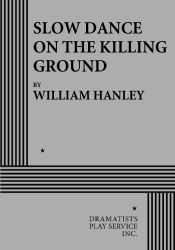THE STORY: As the curtain rises, a poor, dusty shop with its dirty window obscuring the dark hostile night, with its mean little counter, and with its jukebox glaring vulgarly from the side, the storekeeper is taking inventory. The door is flung open, letting in a lithe young black man, weirdly gotten up in a soft, high-crowned hat, sunglasses, a cape, short slacks, and sneakers. Mr. Hanley calls this act Pas de Deux. In this dance for two, the characters make hesitant approaches, circle, feint, threaten each other with gun and ice pick, but scarcely make contact. The young man is obviously a hunted man. Through the circumlocutions of his odd mixture of jive talk and fancy literary allusions, there pants a sense of terror. The storekeeper is a non-Jewish refugee from Nazi Germany, is close-mouthed, suspicious, anxious to avoid self-involvement. In the second act, the Pas de Deux becomes Pas de Trois. The third dancer is Rosie, an eighteen-year-old from Riverdale, who has wandered into the shop after losing her way while looking for the address of an abortionist. Rosie has no illusions about her homeliness or about the encounter that has led to her troubles. The laconic German and the flowery young man react to her with a sensitivity and concern that seem to diminish the furies within them. But not for long. Finally the German is driven to revealing the truth about himself as the young man, at last, in the third act, faces his inexorable fate out there on the killing ground.
A work of extraordinary power and compassion. “…the most original serious play we have had in our theatre in a long time.” —New York Daily News.
“…an event of forceful and steady arresting dramatic interest.” —New York Post.
“Mr. Hanley writes with richness of imagination and with penetration into the heart. He brings humor, tenderness and understanding into the theater, lighting it up with the ardor of his vision.” —The New York Times.
